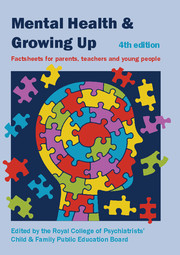Book contents
- Frontmatter
- Contents
- Contributors
- Factsheets for young people
- Factsheets for parents, carers and anyone who works with young people
- 1 Good parenting
- 2 The restless and excitable child
- 3 Dealing with tantrums
- 4 Children who soil or wet themselves
- 5 Sleep problems in childhood and adolescence
- 6 Behavioural problems and conduct disorder
- 7 Attention-deficit hyperactivity disorder (ADHD)
- 8 The child with general learning disability
- 9 Specific learning difficulties
- 10 Autism and Asperger syndrome
- 11 Depression in children
- 12 Worries and anxieties: helping children to cope
- 13 Divorce or separation of parents: the impact on children and adolescents
- 14 Death in the family: helping children to cope
- 15 The emotional cost of bullying
- 16 Traumatic stress in children
- 17 Domestic violence: its effects on children
- 18 Child abuse and neglect: the emotional effect
- 19 Drugs and alcohol: what parents need to know
- 20 Self-harm in young people
- 21 Psychosis
- 22 Schizophrenia
- 23 Bipolar disorder in children and adolescents
- 24 Obsessive–compulsive disorder in children and young people
- 25 Eating disorders in young people
- 26 Chronic physical illness: the effects on mental health
- 27 Medically unexplained physical symptoms
- 28 Chronic fatigue syndrome: helping your child get better
- 29 Parental mental illness: the problems for children
- 30 Who's who in CAMHS
22 - Schizophrenia
from Factsheets for parents, carers and anyone who works with young people
Published online by Cambridge University Press: 02 January 2018
- Frontmatter
- Contents
- Contributors
- Factsheets for young people
- Factsheets for parents, carers and anyone who works with young people
- 1 Good parenting
- 2 The restless and excitable child
- 3 Dealing with tantrums
- 4 Children who soil or wet themselves
- 5 Sleep problems in childhood and adolescence
- 6 Behavioural problems and conduct disorder
- 7 Attention-deficit hyperactivity disorder (ADHD)
- 8 The child with general learning disability
- 9 Specific learning difficulties
- 10 Autism and Asperger syndrome
- 11 Depression in children
- 12 Worries and anxieties: helping children to cope
- 13 Divorce or separation of parents: the impact on children and adolescents
- 14 Death in the family: helping children to cope
- 15 The emotional cost of bullying
- 16 Traumatic stress in children
- 17 Domestic violence: its effects on children
- 18 Child abuse and neglect: the emotional effect
- 19 Drugs and alcohol: what parents need to know
- 20 Self-harm in young people
- 21 Psychosis
- 22 Schizophrenia
- 23 Bipolar disorder in children and adolescents
- 24 Obsessive–compulsive disorder in children and young people
- 25 Eating disorders in young people
- 26 Chronic physical illness: the effects on mental health
- 27 Medically unexplained physical symptoms
- 28 Chronic fatigue syndrome: helping your child get better
- 29 Parental mental illness: the problems for children
- 30 Who's who in CAMHS
Summary
What are the symptoms of schizophrenia?
Schizophrenia affects everybody differently. There are two groups of symptoms, which are described as ‘positive’ and ‘negative’. This doesn't mean that some are good and some are bad; more that some are about ‘doing’ things or experiencing symptoms, and some are about ‘not doing’ things. Young people with schizophrenia often have a mixture of the two.
Sometimes, the illness develops slowly and can be hard to spot, whereas in other young people the illness begins very quickly.
Positive symptoms
• Strange beliefs or delusions are very strongly held beliefs that are not only untrue, but can seem quite bizarre. The young person may believe that they are someone different, a world leader or celebrity for example, or they may believe that other people are ‘out to get them’. They will believe this is true, no matter what you say.
• Thought disorder is when someone is not thinking straight and it is hard to make sense of what they are saying. Their ideas may be jumbled up, but it is more than being muddled or confused.
• Hallucinations are when someone sees, hears, smells or feels something that isn't really there. The most common hallucination that people have is hearing voices. In schizophrenia, hallucinations are totally real to the person having them. This can be very frightening and can make them believe that they are being watched or picked on. People who are having these experiences may act strangely. For example, they may talk or laugh to themselves, or appear to be talking to somebody that others can't see.
Negative symptoms
The young person who has schizophrenia can become withdrawn and appear unemotional. They seem to lose interest, stop washing regularly and can spend a lot of time on their own. They may not be able to carry on with their normal activities, and usually find it difficult to concentrate on work or study.
Other symptoms
Some young people can become frustrated and angry, even towards their own family. Others may take drugs or drink alcohol to feel better. Some find the symptoms so distressing that they want to self-harm.
In spite of how they are described in the media, people who have schizophrenia are not more dangerous or violent than anyone else.
- Type
- Chapter
- Information
- Mental Health and Growing UpFactsheets for Parents, Teachers and Young People, pp. 111 - 113Publisher: Royal College of PsychiatristsPrint publication year: 2013



